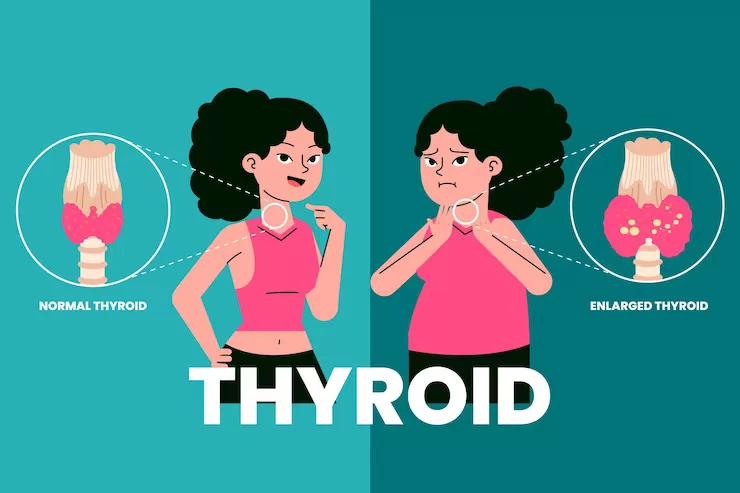Hashimoto’s Thyroiditis: Symptoms, Causes, and Treatment

Hashimoto’s thyroiditis is an autoimmune disorder that affects the thyroid gland, which is responsible for producing hormones that regulate metabolism. Also, In Hashimoto’s thyroiditis, the immune system attacks the thyroid gland, causing inflammation and damage. This can lead to hypothyroidism, a condition in which the thyroid gland does not produce enough hormones.
Table of contents
Symptoms of Hashimoto’s Thyroiditis
Hashimoto’s thyroiditis can develop slowly over time, and some people may not notice any symptoms until the condition is in its advanced stages. The most common symptoms of Hashimoto’s thyroiditis include:
- Fatigue
- Weight gain
- Sensitivity to cold
- Dry skin and hair
- Constipation
- Joint pain
- Muscle weakness
- Depression
- Memory problems
therefore, If you experience any of these symptoms, it is important to see a healthcare provider for evaluation and treatment.
Causes of Hashimoto’s Thyroiditis
The exact cause of Hashimoto’s thyroiditis is not known, but it is believed to be a combination of genetic and environmental factors. Some of the risk factors for this disease include:
- Gender: Women are more likely to develop this type of thyroiditis than men.
- Age: The condition is most common in people aged 60 and above.
- Family history: Also, If someone in your family has this disease, you may be at increased risk of developing the condition.
- Other autoimmune disorders: If you have other autoimmune disorders, such as type 1 diabetes or rheumatoid arthritis, you may be at increased risk of developing Hashimoto’s thyroiditis.
Treatment for Hashimoto’s Thyroiditis

While there is no cure for Hashimoto’s thyroiditis, there are treatments available that can help manage the symptoms and slow the progression of the disease. Treatment options may include:
- Hormone replacement therapy: This treatment involves taking synthetic thyroid hormones to replace the hormones that the thyroid gland is not producing.
- Anti-inflammatory medications: These drugs can help reduce inflammation in the thyroid gland and alleviate symptoms such as joint pain and muscle weakness.
- Surgery: In rare cases, surgery may be recommended to remove part or all of the thyroid gland.
In addition to these treatments, lifestyle changes such as reducing stress, getting enough rest, and eating a healthy diet can also help manage the symptoms of this disease.
Conclusion
Hashimoto’s thyroiditis is a serious autoimmune disorder that can lead to hypothyroidism if left untreated. Therefore, If you experience any symptoms of this disease, it is important to see a healthcare provider for evaluation and treatment. By following your doctor’s treatment plan and making lifestyle changes, you can help manage the symptoms of Hashimoto’s thyroiditis and maintain your quality of life.
Products That We Suggest for You
Nutritional support for healthy thyroid function-Thyroid Support
VitaPost Thyroid Support is a bespoke blend of ingredients specifically to help support healthy thyroid hormone production.
To know more and purchase, Click Here
Thyromine- Thyroid Health Supplement
Our potent, high-quality supplement can: Support a healthy digestive tract. Also it supports healthy nutrient absorption. Support a healthy immune system
To know more and purchase, Click Here








Comment to this Article
Comments that encourage respectful conversation are welcomed at AGP Health n Beauty. Stay on subject, please. Comments that are aggressively promotional of goods or services or that include personal attacks, vulgar language, or other forms of abuse will be deleted. Which remarks break our comment policy will be decided at our discretion. (Anonymous comments are accepted; just leave out your name in the comment box. Although necessary, your email address won't be posted with your comment.)